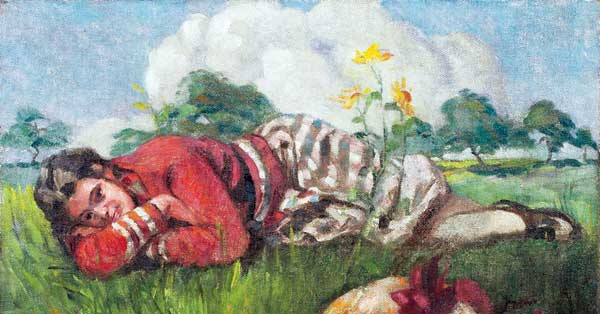
On a bitterly cold day in January 2010, I took the train from New York to New Haven to interview the world’s most eminent expert on daydreaming, psychologist Jerome L. Singer. He met me in his office—a tiny room overlooking a snow-covered cemetery—on the seventh floor of a building housing Yale University’s psychology department. For more than an hour, Singer talked about his research, which he began in the 1950s and described in his fascinating 1975 book, The Inner World of Daydreaming, an enthralling study of the role mindwandering from childhood to adulthood. Before I left, I asked him to sign my copy. He wrote, “To Josie: May you have some fine daydreams and even more some ‘real experiences.’—Jerome Singer.”
Now 89 years old and a Yale professor emeritus, Singer has published numerous books and papers on daydreaming, imagination, creativity, and children’s play. The latest article about his work, “Ode to Positive Constructive Daydreaming,” appeared this September. He is listed as a co-author with New York University adjunct professor of psychology Scott Barry Kaufman and Rebecca McMillan, director of online education for the Gifted Homeschoolers Forum. The paper reviews what Kaufman and McMillan call Singer’s “enormous contribution to the field,” in particular his focus on the positive aspects of daydreaming: its ability to enhance social skills and enable us to plan for the future, offer a reprieve from boredom, and just, well, mentally entertain ourselves.
As I’ve written in the magazine Scientific American Mind, daydreaming can have its dark side: recent research on compulsive fantasizers shows that a small subgroup of people can become so involved with their own invented inner lives that they have trouble forming personal relationships or engaging with the real world. But Singer, Kaufman, and McMillan celebrate the fruitful results of woolgathering, in particular its capacity to provide us with creative insights and understanding of our own and others’ experience.
One good example is research by Mary Helen Immordino-Yang of the Brain and Creativity Institute at the University of Southern California in Los Angeles. She has found that “constructive internal reflection,” as demonstrated by activity in the brain’s “default mode network”—which becomes active when our minds wander—is critical for children’s emotional learning: their ability to feel compassion and empathy. The constant distraction of social media and texting, she suggests, may undermine the development of these skills.
I was enchanted to learn that the three co-authors of “Ode to Positive Constructive Daydreaming” daydreamed their way toward its composition. As McMillan described in an email to me, “I’d start by allowing my eyes to slip out of focus and stare into space or at my computer screen without really seeing. I would then enter my internal stream of consciousness and drift along amid the sea of material I’d been reading—more than 100 journal articles in the first few weeks. … It was as if I was gliding effortlessly along as hazy concepts floated past me like giant blocks or icebergs. … After a few minutes, I’d emerge from my reverie with a new connection, synthesis, or insight that allowed me to see how the concepts fit together.”
As for me, I took Singer’s advice to heart. By the end of 2010, I had given birth to twins—children I had dreamed about for many years. The “real experience” of motherhood is, of course, better by far than the finest daydream I could ever conceive.

